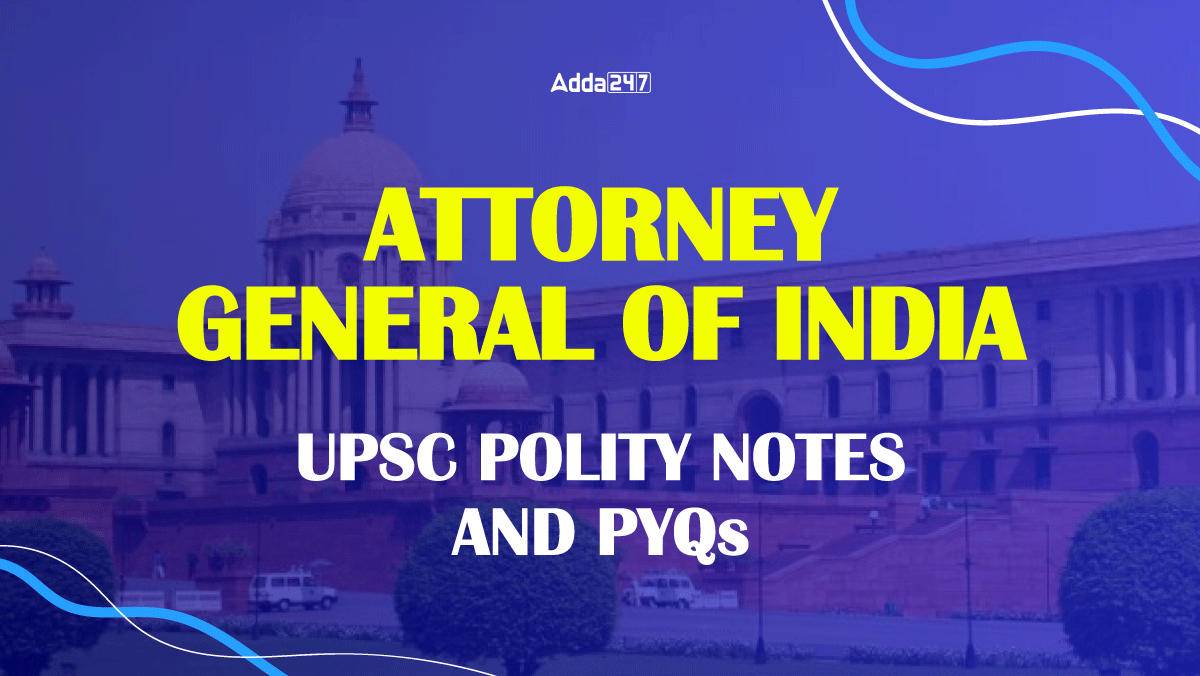Table of Contents
The Attorney General of India functions as the primary legal advisor to the government of India and represents the government of India in legal matters before the Indian Supreme Court. The role and duties of the Attorney General, along with its scope, are concisely outlined in Article 76 of Part V of the Indian Constitution. Article 76 of Part V in the Indian Constitution highlights the role of the Attorney General of India.
Attorney General of India UPSC Notes
Here you can check out the Attorney General of India UPSC Notes where we have covered appointment, term, duties, functions and rights of Attorney General for UPSC Prelims and Mains GS 2 paper. Also we have attached the Attorney General of India UPSC Notes PDF so that you can download and save Attorney General UPSC Notes for future reference.
Appointment of Attorney General of India
Here we have discussed about the Attorney General of India:
- Attorney General of India is appointed by President.
- For the appointment the person shall be eligible and qualified to be judge of Supreme Court.
- He must have been judge of high court for at least 5 years or advocate of some high court for 10 years.
Term of Attorney General of India
Read out this section for understanding about the term of Attorney General of India:
- Term of office for Attorney General is not fixed by the constitution.
- He holds office during pleasure of the president.
- No process for removal has been mentioned in the constitution.
- He can resign by submitting his resignation to the president of India.
- Generally the Attorney General resigns when the Council resins as he is appointed on its advice.
Attorney General of India Salary
The Attorney General of India is the principal legal advisor to the Government of India and enjoys a high salary and other perks. Here is a breakdown of their salary and allowances:
- Basic Pay: The basic pay of the Attorney General is ₹2,25,000 per month.
- Retainer Fees: The Attorney General is also paid a retainer fee of ₹50,000 per month.
- Sumptuary Allowance: The Attorney General is also entitled to a sumptuary allowance of ₹4,000 per month.
- Other Allowances: The Attorney General is also entitled to other allowances, such as house rent allowance, travel allowance, and medical allowance.
The Attorney General of India is a highly paid and privileged position. The salary and allowances are very generous, and the Attorney General also enjoys a number of other perks. However, the Attorney General also bears a heavy responsibility. He is the government’s chief legal advisor and represent the government in court. They play a vital role in the protection of the rule of law and the advancement of justice in India.
Attorney General of India Duties
The Attorney General of India has a number of duties which includes:
- Giving legal advice to the Government of India: The Attorney General is the government’s chief legal advisor and is responsible for giving legal advice on all matters of law. They are consulted by the government on a wide range of issues, including constitutional law, international law, and human rights law.
- Performing other duties as may be assigned by the President: The Attorney General also performs other duties as may be assigned to them by the President. These duties may vary depending on the needs of the government.
- Supervising the work of the Department of Legal Affairs: The Attorney General is responsible for supervising the work of the Department of Legal Affairs, which is the government’s law department. The Department of Legal Affairs is responsible for providing legal advice to the government and for representing the government in court.
President has assigned the AG following duties:
- Prosecuting cases on behalf of the Government of India: The Attorney General is responsible for prosecuting cases on behalf of the government in the Supreme Court and other courts in India. They also represent the government in criminal cases.
- Appearing on behalf of the Government of India in Supreme court: The Attorney General is the government’s chief advocate in court and appears on behalf of the government in all cases in the Supreme Court and other courts in India.
- Appearing on behalf of the Government of India in High court: Attorney General of India appears on behalf of government of India in High Court for all cases where Government of India is to be concerned.
Rights of Attorney General of India
While serving as Attorney General, the rights granted are –
- Right of audience in all courts of India.
- He also has right to speak and to take part in proceedings of both houses i.e. Rajya Sabha and Lok Sabha, in their joint sitting and any committee for which he has been named.
- He enjoys immunities enjoyed by the member of parliament, but not the right to vote.
- Attorney General does not fall in category of government servant and is not debarred from private legal practice.
Read below regarding the limitations of the Attorney General of India.
Limitations of the Attorney General of India
Along with the rights granted to the attorney general of India, there are certain limitations to his role, discussed below:
- He should not advise any party against government of India.
- He should not defend accused of criminal activities, without permission from government of India.
- He should not be appointed to director of any company, without permission of government of India.
Articles related to Attorney General of India
In this section we have mentioned about the articles in the constitution which deals with the Attorney General of India
| Article | Subject |
| 76 | Attorney General of India |
| 88 | Rights of Attorney General of India |
| 105 | Powers and privileges of Attorney General of India |
Attorney General of India UPSC PYQs
Now that you have skimmed through the Attorney General of India UPSC Notes, you should be able to answer the UPSC PYQs for Attorney General of India.
Here, in addition to Attorney General UPSC Notes we have curated Attorney General UPSC PYQs both for prelims and mains GS2 paper, check out your grip over the topic by practicing below mentioned Attorney General of India UPSC PYQs.
UPSC Attorney General of India Prelims PYQs
Q1. With reference to India, consider the following statements:
- Government law officers and legal firms are recognized as advocates, but corporate lawyers and patent attorneys are excluded from recognition as advocates.
- Bar Councils have the power to lay down the rules relating to legal education and recognition of law colleges. (UPSC Prelims 2022)
Which of the statements given above is/are correct?
(a) 1 only
(b) 2 only
(c) Both 1 and 2
(d) Neither 1 nor 2
Q2. Consider the following statements:
- Attorney General of India and Solicitor General of India are the only officers of the Government who are allowed to participate in the meetings of the Parliament of India.
- According to the Constitution of India, the Attorney General submits his resignation when the Government which appointed him resigns.(UPSC Prelims 2022)
Which of the statements given above is/are correct?
(a) 1 only
(b) 2 only
(c) Both 1 and 2
(d) Neither 1 nor 2
Q3. Consider the following statements:
Attorney General of India can
- take part in the proceedings of the Lok Sabha
- be a member of a committee of the Lok Sabha
- speak in the Lok Sabha
- vote in the Lok Sabha
Which of the statements given above is/are correct? (UPSC 2022)
(a) 1 only
(b) 2 and 4
(c) 1, 2 and 3
(d) 1 and 3 only
UPSC Attorney General of India Mains PYQs
Q1. The Attorney-General is the chief legal adviser and lawyer of the Government of India.” Discuss. (2019)
Attorney General of India UPSC Notes PDF
Download the Attorney General UPSC Notes PDF to prepare thoroughly for the topic in both the UPSC prelims and Mains GS2 paper. Below we have provided UPSC Notes PDF for Attorney General of India, which candidates can download, study, and keep for future reference to strengthen their understanding of the subject.
Download the Attorney General of India UPSC Notes PDF for UPSC Prelims and Mains Exam
UPSC Notes :
Check out the links in the table for referring to more articles published by us
List of Attorney General of India
The position of Attorney General holds a significant role within the country’s legal and governmental framework. The Attorney General is the highest-ranking legal advisor to the Central government and serves as its representative in legal matters before the Indian Supreme Court. Here is a list of some notable individuals who have held the esteemed position of Attorney General of India.
Here are some of the most notable Attorney Generals in India from 1950 to 2022:
- Motilal Chimanlal Setalvad (1950-1963): The first Attorney General of India, Setalvad was a renowned jurist and freedom fighter. He played a key role in the drafting of the Indian Constitution and was involved in many landmark cases, including the Gopalan case, which upheld the right to privacy.

- K. Parasaran (1980-1989): Parasaran was a highly respected lawyer who served as Attorney General for two terms. He was involved in many important cases, including the Shah Bano case, which dealt with the rights of Muslim women.

- Soli Sorabjee (1973-1977, 1989-1990): Sorabjee was one of the most eminent jurists of India. He served as Attorney General for two terms and was involved in many landmark cases, including the Keshavananda Bharati case and the Mandal Commission case.

- Mukul Rohatgi (2017-2019): Rohatgi is a highly experienced lawyer who served as Attorney General for two years. He was involved in many important cases, including the Rafale deal case and the Ayodhya title dispute case.

| List of Attorney General of India | |
| Name of the Attorney General | Tenure |
| M.C. Setalvad | 28 January 1950 – 1 March 1963 |
| C.K. Daftari | 2 March 1963 – 30 October 1968 |
| Niren de | 1 November 1968 – 31 March 1977 |
| S.V. Gupte | 1st April 1977 – 8th August 1979 |
| L.N. Sinha | 9th August 1979 – 8th August 1983 |
| K. Parasaran | 9th August 1983 – 8th December 1989 |
| Soli Sorabjee | 9th December 1989 – 2nd December 1990 |
| J. Ramaswamy | 3rd December 1990 – November 23rd, 1992 |
| Milon K. Banerji | 21st November 1992 – 8th July 1996 |
| Ashok Desai | 9th July 1996 – 6th April 1998 |
| Soli Sorabjee | 7th April 1998 – 4th June 2004 |
| Milon K. Banerjee | 5th June 2004 – 7th June 2009 |
| Goolam Essaji Vahanvati | 8th June 2009 – 11th June 2014 |
| Mukul Rohatgi | 12th June 2014 – 30th June 2017 |
| K.K. Venugopal | 30th June 2017 – September 22nd, 2022 |
| R. Venkataramani |
1st October 2022 – till date
|



 UPPSC RO ARO Previous Year Question Pape...
UPPSC RO ARO Previous Year Question Pape...
 RPSC RAS Mains Score Card 2025 Out, Chec...
RPSC RAS Mains Score Card 2025 Out, Chec...
 UPPSC Cut Off 2024, Expected and Previou...
UPPSC Cut Off 2024, Expected and Previou...
